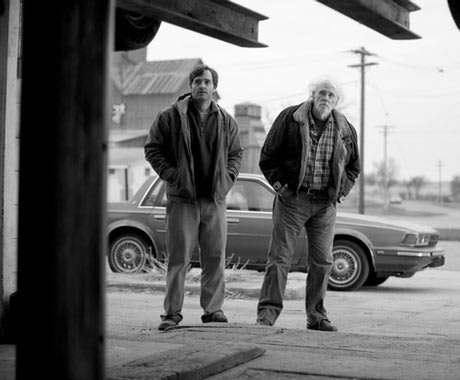In Alexander Payne's Nebraska, an ornery old man (Bruce Dern) gets a letter that says he's won a million dollars and, ignoring his family's insistence that it's a scam, sets out to claim his prize money in a nearby city. His adult son (Will Forte) reluctantly joins, unsure if he's there to protect him from inevitable disappointment by making him turn back or to help him pursue his small, desperate dream.
At first glance, the black and white landscapes of Payne's Nebraska recall the iconic cover of the Bruce Springsteen album with which it shares its name. But the similarities end there; Springsteen's brooding and affecting album is full of poignant character studies, whereas Payne delivers a deadpan mockery of small town life; a scene in which Dern and Forte sit with their relatives to watch a football game in relative silence feels condescending towards the quiet simplicity of rural life. As in the rest of the film, any nostalgia thrown in as a counterbalance feels insincere.
Whether it's Payne's own upbringing in Nebraska and his return to filming there after detours to California (Sideways) and Hawaii (The Descendants) that's responsible for the mixed feelings or not, the director goes too far selling the difference between his home state and the sandy, George Clooney-inhabited beaches of the West Coast by draining the actual Nebraska of all its color and inhabiting it mostly with a cast of amateur actors.
Dern, who won Best Actor at the Cannes Film Festival for his performance, will probably continue to receive praise going into Oscar season. Too bad he'll also overshadow Forte, who makes the most of his limited, eye rolling "Oh Dad" part by delivering a charming but wounded character, giving the sort of heartfelt dramatic performance only a comedian can give.
Payne seems to have regressed from his other films. Whereas Election satirized the bizarre social hierarchy of high school and Sideways subtly mocked the pretentiousness of wine connoisseurs, with Nebraska, the director struggles to look at small town life without a smug sense superiority. The jokes feel misguided and Payne ultimately seems just as adrift as his characters.
(Paramount Vantage)At first glance, the black and white landscapes of Payne's Nebraska recall the iconic cover of the Bruce Springsteen album with which it shares its name. But the similarities end there; Springsteen's brooding and affecting album is full of poignant character studies, whereas Payne delivers a deadpan mockery of small town life; a scene in which Dern and Forte sit with their relatives to watch a football game in relative silence feels condescending towards the quiet simplicity of rural life. As in the rest of the film, any nostalgia thrown in as a counterbalance feels insincere.
Whether it's Payne's own upbringing in Nebraska and his return to filming there after detours to California (Sideways) and Hawaii (The Descendants) that's responsible for the mixed feelings or not, the director goes too far selling the difference between his home state and the sandy, George Clooney-inhabited beaches of the West Coast by draining the actual Nebraska of all its color and inhabiting it mostly with a cast of amateur actors.
Dern, who won Best Actor at the Cannes Film Festival for his performance, will probably continue to receive praise going into Oscar season. Too bad he'll also overshadow Forte, who makes the most of his limited, eye rolling "Oh Dad" part by delivering a charming but wounded character, giving the sort of heartfelt dramatic performance only a comedian can give.
Payne seems to have regressed from his other films. Whereas Election satirized the bizarre social hierarchy of high school and Sideways subtly mocked the pretentiousness of wine connoisseurs, with Nebraska, the director struggles to look at small town life without a smug sense superiority. The jokes feel misguided and Payne ultimately seems just as adrift as his characters.
